#in case you don't know how AI dungeon works
Explore tagged Tumblr posts
Text
ÞŘỊPŁƏ ẄŒØ
A/n: As much as we all love current Jinwoo, every version of Jinwoo is precious. And SO!
All Jinwoos have romantic feelings for you but not for each other cause they're the same person.
Triple Sung Jinwoo x Fem!Adult!Reader
CW: MANWHA SPOILERS INSIDE! SPOILER ALERT: There will be a PT 2 to this one shot cause this got kinda long. So there's that.
BIG TIME What if AU. Angst, hurt/comfort, depression, chronic problems, sleeping anxiety.
NO PLAGARIZING, REPOSTING, TRANSLATING, USE OF MY FANFIC WORK IN AI STUFF ALLOWED. REBLOG, LIKE AND FOLLOW INSTEAD PLS N THNX.

You never imagined you'd become the light of your angel's life. You still have days when you think that it's all been one long dream and you'd wake up back in that grey lonely life you never want to go back to.
But no, waking up that afternoon in your shared spacious bedroom. Rolling in that King sized bed to detect his side had his scent lingering still. But empty. Meaning he hadn't returned from his guild work from yesterday.
The sound of the front door to your shared home opening got your heart racing with joy at the chance to see your dear Monarch again.
And yet, the ensuing situation that followed suit really did feel like walking into a dream. An unusual one at that, sure. But also quite intriguing.
“Neither a curse nor a status debuff, my ass. You'd think these new Monarch powers could undo this side effect?” The tallest Jinwoo grumbled under his breath, brushing back his hair in frustration, pacing back and forth in the living room.
“How are we supposed to be out in public now? Handle the guild? Seeing our folks? Our secret will be found out at this rate!” Post reawakened Jinwoo griped, pinning you in between him and pre reawakened Jinwoo like a sandwich, to your dopey smiling satisfaction.
“In any case, I'll be the one visiting the guild for those matters. Otherwise, you and I will tackle the dungeons ourselves, alone.”
“H-Hang on! Why should I be left behind?! I'm no male housewife!” Starter Jinwoo whined.
“Yeah, don't kid yourself, squirt.” Monarch Jinwoo ruffled his unruly mop of hair affectionately, his baby faced counterparts pouting and puffed up cheeks proving his point.
“Aw, please don't leave me alone.” You nuzzled his pink dusted face like a needy cat, that got him melting up.
“Uh – I – o – okay~” His bashful smile got you planting a big ol smooch on his lips. He couldn't stop smiling as he swooned over your lap.
Jinwoo #2 glared, a vein popping up on his head. “Hey, it's not fair he gets to hog our sweetheart all to himself all day while we have to work.”
“With no reawakening, he can't level up so he'd be putting himself at Death's door again like before. If even one of us dies, we'll all die and leave our family behind, including our beloved here. And they won't be defenseless.” King Jinwoo explained.
The sight of Beru appearing out of your Shadow got Jinwoo#1 trembling from fear instinctively at the imposing entity when Monarch Jinwoo stood between you two and his General.
“Should any harm come to these two, like getting distracted by your period dramas, you know what will happen, don't you?” The deadly gaze of his King spoke doom for the former Ant King.
Shadow Preservation will let him know the moment Beru fumbles.
“Yes, I do, my liege! I will not let you down! And if I fail, I will gladly accept my punishment! But please give me a chance to prove my usefulness to you all!” Beru weeped before his liege dismissed him, meshing into the shadow of —
“Jinwoo mochi.”
“ … Eh?” All three sweat dropped in sync.
The action of cupping OG Jinwoo's supple cheeks, kneading and pinching and rubbing your thumbs in circles on such pure smoothness had your eyes sparkle in wonder and your hums of content heard behind your smitten grin. The visual of pre Jinwoo's face going from pale to rosey red as his grey blue eyes had spirals of tipsy dazeness, incomprehensible sounds spilling out of his dopey smile.
“You are so fucking cute, I can't stand it!” Your playful growling as you indeed began chewing on his cheeks got his nervous laughs rumbling into your chest next, his heart in overdrive, matching beat for beat with yours.
The steamy blow of air through their noses was one warning signal that the other two Jinwoo were irked — envy molten auras in blue and purple another sign — that baby-faced them was getting your current attention.
“Don't you dare forget about me, beautiful~” Jinwoo the 2nd cockily purred in your ear, plopping behind you on the couch, nipping at your nape, his nose dotingly rubbing your cheek, keeping you struggling between focus on both bois.
“I'll engrave myself in your mind then~” The effortlessly hot deepness of King Jinwoo’s inflection had him gently grip your chin to raise your face to meet him over the couch in quite a devouring kiss.
“Hey, sharing is caring, you sneaky bastards!” Baby Jinwoo shrilled up. Breaking free just to save your deprived lungs, an all out argument between all three ensued, your light headed self slacking against the couch.
The cacophony of range these three voices could go filled in your now lively place.
And so, then began this unexpected arc in the story of you and Jinwoo times three.
Pre-reawakened Jinwoo.
While the other two would do their dungeon raids together, that meant you'd spend most of your time with him.
Stuck at home together meant you teaming up to manage it, whether that be folding laundry to even cook together. If you don't really cook, he's more than happy to teach you. Having his hands layer yours, pressed up against you from behind, is the best feeling. Course he'd melt in a puddle shortly after.
Taking walks together outdoors meant holding hands or intertwined arms as you spent hours chatting about anything, mesmerized in each other's eyes while admiring the flora and fauna of nature.
“Okay, I am the male wife.” He mumbled in surrender, slumping against you, both of you in your casual tees and shorts, binging your favorites together in the living room while sharing your snacks together one lazy day.
“He admits it!” You exclaimed dramatically, ruffling his already unruly shaggy mop to his giggling delight.
“I know I'm not like the other mes… but I will do my best to make you happy. I'll do anything for you. I love you with all my heart, saarang.”
You easily top him over, laying atop him, your bedroom eyes conjuring hearts in his grey blue irises. “Then I'll make sure you're reminded each and every day that you're just as well loved. You're all mine now, baby girl~”
His drawn out squeak was the only sign of him still alive from the embarrassment, slacking in your arms like a limp noodle.
He's the easiest to mess with, all out of love.
Post reawakened Jinwoo, still an E-rank.
You did most of your outings into the city with him. Usually he goes incognito, whether in caps and a face mask or keeping his hoodie on, hoping not to be spotted and mistaken for his S-rank self.
You both did the buying, groceries and window shopping. Your phone gallery was chock full of selfies with you and your bashful grinning hunter.
While Tank became his assigned Shadow in the meantime, he could serve as transport. But only when it was just you two around or unless it's an emergency. Besides, he still has his own speed skills. Hence, giving you piggyback rides before zipping away in a flash, leaving folk wandering nearby nearly falling over from the sudden strong gusts of winds he left in his wake. His cheeky grin looking back at you took your breath away.
Joining him in on his daily quest workouts nearly do you in, your physically ailing limits being the root cause. Your legs turn to jelly as you nearly collapse from fatigue but your dashing hunter lover makes sure to catch you in his arms, holding you tightly while riding on Tank for the trek back home.
While you can openly tease and mess with him, he's on even footing with you, even more so.
“It's a pain to be split in three and not knowing how long it'll last, so having you with me is a blessing. Now tell me, what will it take for you to make me the best Sung Jinwoo in your eyes? Come on, honey, let your angel Woo you over~”
That cheesy pun out of the blue sent you buckling over in bouts of laughter, nearly falling over but his arms enveloping you kept you standing within his grasp. “Wow. Can't believe that actually worked,” He murmured in astonishment, grinning confidently in response. “She has Sung her approval~!”
That got you cackling, clutching your aching tummy, as more puns came your way to leave you a breathless mess that went beyond his expectations, utterly convinced to be more silly from that point on, even after he hopefully becomes whole again.
And Shadow Monarch Jinwoo, the tenth S-rank hunter in Korea and the head of his own guild, is hands down the most possessive over you. The rare moments you get alone with him happen in his own private office when he takes you to work with him.
The selfie of him putting you in an explicit headlock rivaled every single photo you took with his reawakened past self. His vibrant violet eyes on his smug smirking face littered by your lipstick smooches, your blushing squished cheeks, those veins along that flexing bicep smothering your lip smeared shameless face.
Making a group chat with just the Jinwoos proved a bad call when the other two were driven up the wall with envy at their superior version laying claim to you when they weren't around. The stream of emojis from Jinwoo 1 merging with the countless threats from Jinwoo 2 made big boss Jin darkly chuckle in the entertaining response, the mirthful twinkle in his eyes rippling from spotting you red in the face like mush in his big leather desk chair.
Unwinding from the stress of his guild master duties and keeping face with his colleagues and family while also having to wait out however long this three in one problem will last. Taking rides together on Kaisel gave you both a much needed breath of fresh air. Updating you on pupil Jinwoo's progress leveling up although the Gates turn red whenever he joins in said gate all to challenge him. He assures you immensely that he ensures his other self’s safety while sharing the EXP.
“Sharing you with my other selves has been quite the test for my tolerance.” Tugging insistently on his tie, the taut muscle definition of his upper chest peaked out, his neck flexing those veins, flaring his collar out in the process. “However, I am resolved to remind them just who truly is in charge here.” Pinning you literally on top of his desk came just as quick as you did already feeling him brush up against your valley. “Including you~”
Chronic problems plagued your form. Daily migraines, tense knots in your neck, the works. Regardless of which Jinwoo does it, massages always come your way. Whether resting your head on their lap or laying down on the bed, you melted from their shared skill touch.
Of course not every day is sunshine and rainbows. With chronic issues also came depression. Of course, all three dudes come to an agreement on equally giving you space to unwind as well as teaming up to give you all their affection.
Jinwoo #1 gifts you single flowers that grew surrounding your home, placing them behind your ear after presenting you one each day. Home-cooked meals are a given at this point, keeping in mind your allergies and dietary restrictions should you have any. He helps prepare salt baths that you more than invite him to join you to keep your clingy self company. And he lends his hoodie for comfort on those moody grey days.
Jinwoo #2 gifts you during your shopping sprees together, purchasing plushies and apparel to even getting fried chicken that you make sure you have enough to share with all your bois at home. You and him game together when he comes home early from raiding. Although his fatigue relief skill kicked in, he still deflated in your embrace welcoming him back home in the foyer, nuzzling your adorable face like a needy feline himself. Plus, his rambunctious commentary sends you into a wheezing mess, handing him easy wins. The times you did dethrone him resulted in his stubborn self knowing he could do better, challenging you for another round.
Jinwoo #3 is the one most able to give you anything your heart desires. With such influence and connections on top of his limitless abilities as the reincarnated Monarch, he would make anything possible. But considering he was the busiest out of the three, all you really wanted was to spend more time together. He still gifted you the same items as his other selves, but he made sure to include a fancy dinner and a dance among the stars as an inviting bonus.
Sleep anxiety is also a struggle you face. Incidents from your dreary past late at night left their scars. So taking naps now and then throughout the day after sleeping in the morning was your norm.
Even now, comfortably sleeping through the night is difficult, anxiety making you uncomfortable on edge for the unpredictable and unknown.
One step, one night at a time, the secure embrace giving you reassuring squeezes in bed reminding you you weren't alone. Whichever Jinwoo it is, they all are perfect bedmates. Their cooing words became your ASMR.
“Ssh. There there. I'm right here. Listen to my breathing, my heart, my voice. You can rest easy now, sweetheart.”
Kissing your teary face and letting you rest on their cozy warm chests as they rubbed comforting circles along your back, the combined sensations slowly aided in your sleep, however long or short.
So returning the favor only made sense.
All three Jinwoos suffered from nightmares. Mostly Jinwoo #1. Night terrors were his own sleep struggle throughout this story arc. Especially from dreams of the Double Dungeon. Breaking out in a cold sweat, tossing and turning, whimpering and weeping, before screaming out in awakening, heaving haphazardly, desperately reaching his hands out to you, clinging to you like the lifeline you are. Especially on nights when your other Jins’ are still out due to whatever reason.
Singing a lullaby song you heard from a show that really stuck with you helped a great deal in calming him down. Cradling him in your arms, brushing through those sweat matted bangs, your voice was the angel of music gracing his ears. It's too mesmerizing to ignore.
“You're okay. You're alright. I'll never ever leave your side. I will stay and I will fight with you~”
Unbeknownst to you two, Beru's shadow linked to both versions of his master, Jinwoo #3 swoons over your heavenly voice, smiling like a lovesick fool, Jinho silently hoping they finish work early so his big bro can get back to you, his one and only.
“Please don't leave me. Please stay, Y/n.” Your Jin baby's wish gets granted by your doting, utilizing the same exact methods they use to treat your night troubles.
Jinwoo 2 is less vocal when he wakes up from bad dreams. Yet you feel a sturdy heat envelope around you. His endearing gaze grew the more he stared at your peaceful face, his stare blurring from warm wetness, blinking them back before pecking your forehead. “You're my dream come true~” He whispers lovingly in your ear before cuddling up against your precious self, tears actually shed as you return the hug through your slumber, thoughts of you and only you lulling him into good old dream land.
Now Jinwoo 3 is something else. He usually sits up, lost in thought for a bit, before heading to the kitchen for a mug of water and maybe even preparing some food to keep him busy. And every time, he could feel you arising, finding him, and joining him all so he wouldn't be alone. He'd do the same for you. They all would, absolutely.
You can hear the aching vulnerability trembling with each breath he took as his towering frame draped over you, his shoulders shaking as his hands clawed at your back, your very existence grounding him in the here and now.
“Parts of me will never be the same, not after all I've done … yet you still choose me. How did I ever deserve you, huh?” His nose caresses yours, rocking with you side to side, as his submerging look sunk its hold upon your trembling soul. “Y/n, you truly are something else. My safe haven~”
While having three Jinwoos is indeed a handful, seeing every part of him that make up who he is reminds you of his empathy, sympathy, cleverness, tactfulness, and brilliance.
But you too hope that your three darlings become whole again soon.
And soon enough, at last, your shared prayers were finally heard.
The solution to this dilemma?
Well ...
What do you think~?
#solo leveling#solo leveling x reader#solo leveling x y/n#solo leveling x you#solo leveling au#sung jinwoo x you#sung jinwoo x y/n#sung jin woo x reader#sung jinwoo x reader#jinwoo sung x reader#solo leveling spoilers#what if au#canon divergent au#anime au#jinwoo sung x you#jinwoo sung x y/n#jinwoo x you#jinwoo x y/n#jinwoo x reader#solo leveling fluff#ore dake level up na ken#only i level up#solo leveling anime#sung jin woo x y/n#sung jin woo x you#solo leveling jinwoo#solo leveling sung jin woo#various x reader#reverse harem#solo leveling fanfic
799 notes
·
View notes
Note
Re: How Dungeons Work
While scolding Laios and Marcille, Flamela mentions that the Canaries would need to prepare a replacement Lord if Marcille wanted to step down. The Lion also mentions falling into the Canaries' hands, and after it is defeated the Queen seems to lament that the Magic/Spell That Grants Any Wish has been lost.
Maybe the Elves were using Dungeons to do something after all?
I find it interesting that the Queen's remark can be read as referring to the Demon itself as a kind of spell, almost like a construct or AI. Thoughts on that?
Lastly, the Ancients built the Dungeons as a counter to the demon's consumption of desires. Do you think they succeeded? Is there a way to use them safely? After all, the Ancients were destroyed by a wish/their own will, not by the demon's agency. Maybe they and maybe even modern Elves know how to act as Lord without getting eaten at all? It seems technically feasible from what we see, Thistle just sealed it away too late.
Hello!
Going by each question
I think they would need a replacement specifically in Marcille's case since she wants to step down, they cant move her to the surface because the dungeon is already spilling out. I imagine the subistitute lord is a temporary solution to remove Marcille from the Dungeon (someone with less destructive wishes)
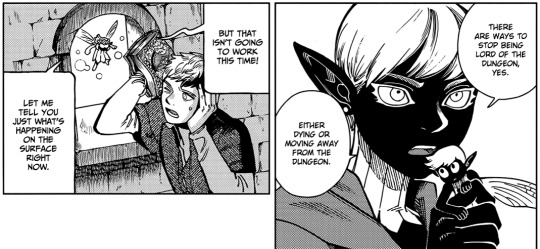
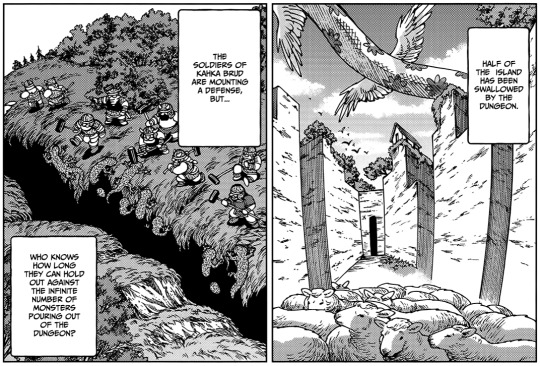
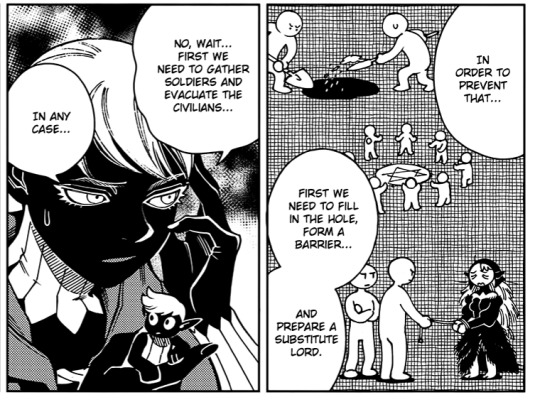
I don't think the elves are doing anything with the dungeon from their track record, since they collapse dungeons, what Kabru dislikes is how they go about it (with no regard for other's), Utaya is an example of just how destructive Dungeons can be. (The canary plans are always to collapse dungeons and there's no hint about it being anything else is there?)
The queen is a weirdo, but to me the way she talks about it sounds more like a relief "'The spell that grants any wish' has been lost. there is time" as in that is no longer an impending danger for their world? EHScans even translates it as "we have the luxury of time"
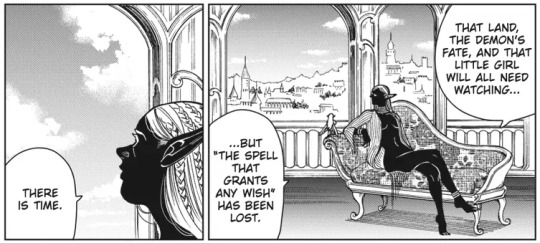
In the world there's also no difference between the demon and magic itself, as we learn in chapter 87 the demon is magic given personality so she's not wrong to call him that.
I think the ancients succeeded in the sense that they managed to seal the demon inside dungeons, but they had the plot lost from the start, having all you wish for granted goes against being a living being, craving and wishing is part of living so it was doomed to fail as it did. The demon also doesn't understand ofc
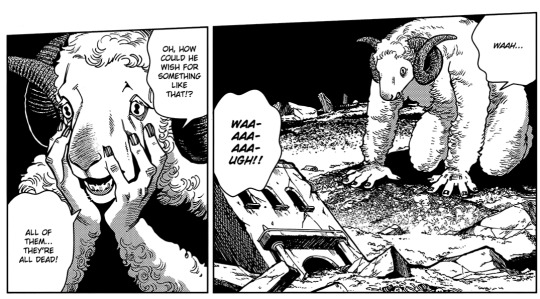
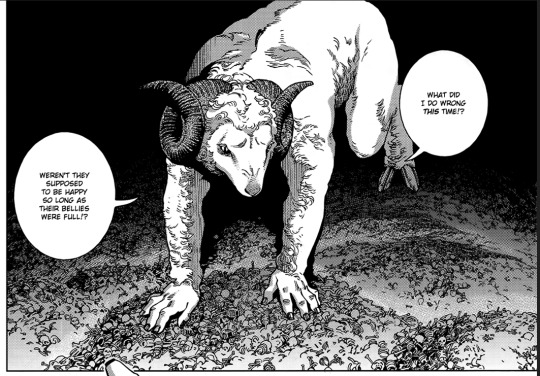
As I said it goes against being human so I don't think it's possible at all to use the demon, you would end up just like the ancients wishing for everyone to die, the best example of why this would never work Kui gives us is the tale Laios tells in the nightmare monster tidbits
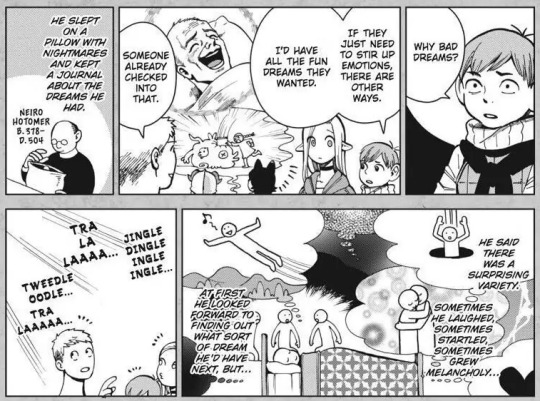
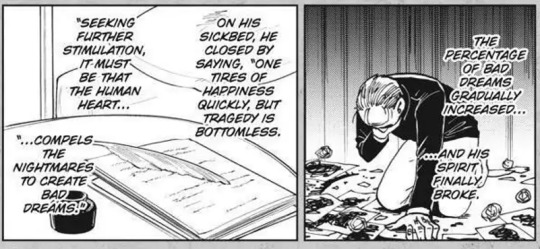
"One tires of happiness quickly, but tragedy is bottomless. Seeking further stimulation, it must be that the human heart compels the nightmares to create bad dreams"
The future the Demon wanted granting everyone's wishes would have probably also ended up in a living hell for them.
Also I don't think Thistle 'sealed him away too late', he kept deteriorating even after locking up the demon it seems. Marcille suffers from it too even after sealing him.
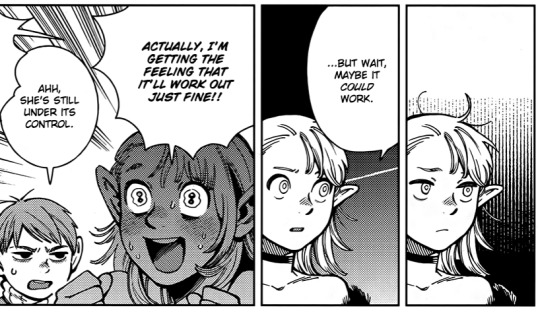
hope these answers helped!
#Dungeon Meshi spoilers#magic system#dungeons#Demon#ancient magic#elves#dungeon lords#dunmeshi thoughts
89 notes
·
View notes
Text
".... I believe it's finally about time I do this."
Icia sits down by her fireplace and starts writing down the same thing on many, many pieces of paper.
This is what she writes:
"Help Wanted to reclaim Digital World"
"I am forming a party to rescue a digital world from a tyrannical AI that is terrorizing and abusing many. Due note that this will not be a safe or small feat, and there will more than likely be many perils involved that could result in serious harm and death, or possibly abstraction. All help is appreciated, but this is not for the faint of heart. I will be willing to supply more details to any and all who are interested. There will be no 'reward' other than the honor of rescuing those in danger and access to a grand, royal, fantastical kingdom that shall flourish once freed (although hopefully, all will be able to access it once saved). Transportation will be by pirates across the void, and I can introduce all who would like to meet them beforehand."
"A letter will be sent out by wind to all who are interested/ willing to fight once plans are finalized and set in stone. I look forward to working with whoever is willing to join me."
"PS: Weapons and a strong sense/understanding of self are highly advised. You may visit me at my house or find me on a walk to ask questions in person, and I will answer to my best ability."
"With my utmost gratitude and fair wishes to you all,
Icia"
Icia finishes the flyers early in the morning, letting the wind carry some to varying locations and visiting other locations she knows of to post them. She posts the flyers at Candleton, the circus, the inn, Oceansbay, the bar, anywhere she can think of.
Now all she has to do is wait.
~~~~~~~~~~~~~~~~~~~~~~~~~~~~~~~~~~~~~~~~~
OKAY IM FINALLY FUCKING DOING THIS
GOD
Okay so.
You heard her
KINGDOMQUEST WOOHOOOOO
Here are the basic rules and info:
I do not have definite days for any of this yet. However, I'm aiming to be ready in 2-3 weeks.
Any number of characters are allowed to join, but you will only be able to rp 1 at a time (with exceptions if you have a good reason, like how Raina and Lance used to be one person). There will be checkpoints where people may switch to different characters between sections
Ik I said you can have as many characters as you want, but please ensure you'll actually use them. I'll try and make this long enough for everyone to use their characters at least once, but really there's no guarantee. Don't just add characters because you can.
I may do what Elsie did and split the quest into two parties. In that case, you can have one active character in each party. This is unlikely, but if it happens then that's how this will go.
THERE WILL BE NO CHARACTER DEATHS EXCEPT FOR THOSE THAT ARE DISCUSSED WITH ME BEFORE HAND. Any other "deaths" (losing all HP) will just be knocked out and unable to use for the rest of the quest unless revived. This also goes for permanent injuries.
No abstraction. None. Characters can get close, but there won't be any full abstraction.
No OP moves (that should be a given).
No Kingdom characters will be allowed to participate in the quest. They are part of the objective, not the fights. Even against Hexe, no CURRENT kingdom members will be able/allowed to fight
No being a smartass and finding loopholes or questioning the rules of the dungeon (you know who you are, love you <3)
Just so yall know what to expect. There'll probably be 4 sections, maybe just 3. There'll be a boss for each, and the very final section will just be Hexe. Plan accordingly.
PLS ask me if you're confused abt something. I'm probably forgetting a couple things to add here but shhhh, yall get the idea
If yall wanna do lore drops during this too, you totally can! If they're really big and will kinda be like a side thing, do be sure to let me know first!!!
Ok I think i got everything down....
Once again, ask me if you're confused abt something or have ideas bc god knows I need those. Also, be sure to DM me which characters of yours will be joining (if any).
And I think the only big delays will be for Dusk and Jessy trying to escape the Railroads AND me being lazy but Imma try and not have that second one happy
OH YEAH ONE MORE THING
THERE WILL BE LORE SCATTERED ABOUT FOR A COUPLE OF MY CHARACTERS, ESPECIALLY SOME THAT HAVE GAINED SOME POPULARITY...
KEEP YOUR EYES PEELED.
I'll reblog/edit this with any necessary information
But for now
GOOD LUCK.
(BTW you don't have to participate if you don't want to, it's ok to not be interested! Also if a character IS participating, just do a really quick in-rp post (or have them send a letter to Icia) & tag me in it so I know.)
5 notes
·
View notes
Text
GOTTA add some headcanons to this
laios spends loads of his playtime just creeping along after the big monsters, taking notes like he's studying a real wild animal. he has a dossier on each one and he's well known in the subreddit for being present at the scene every time someone has a question because the wiki is unclear about something
SOME of his dossier is carefully researched headcanon (speculative skeletal structure, mating habits, etc) but he keeps that in a separate notebook
he also has a third notebook that combines canon and headcanon so he can better imagine it being a real organism. everything is hand-copied
loves those youtube videos like "100 things you DIDN'T know about monster hunter" or "I went into the files to deconstruct how rathalos's AI works in excruciating detail, here's EVERY decision tree!" these don't impact his immersion at all
marcille had a phase where she got SO stressed out about having a PERFECTLY manicured, resetted for, time-traveled, villager-cycled town (this is especially a nightmare on the 3DS version because you have JUST enough power over your town layout to make it frustrating) that even playing became overwhelming and she had to stop. but then she also felt bad for not playing, which compounded the stress of going back to playing
eventually falin got the game so she could play with marcille and marcille bought an entire new switch so she could play without going back to her old town (and without deleting all that hard work!)
the old save file is still sitting there and on the new one marcille has vowed to herself that she won't use any manips or anything (it's still bugging her though. but she does genuinely enjoy playing)
marcille also plays fire emblem. both for the strategy and for the visual novel elements. she talks about it as a high level strategy game to anyone who asks. if a character dies she resets
chilchuck has loads of save files and they're ALL stealth archer. he does pretty much the same thing on each one but he has fun every time like it's a new experience
he LOVES survival mode. this guy will fish in skyrim for an hour. sometimes he sets up with a case of beer like he's fishing irl and has his character down an ale every so often as "bonding". if anyone teases him for this he'll kill them but he genuinely finds it relaxing. video game fishing is basically a gacha
don't get him wrong though, most of his time is spent carefully preparing materials, going into a dungeon, checking every corner, and then stealth assassinating the boss from across the room and rendering the whole thing totally pointless. he does not have any sense of clarity about this and just loves the thrill of the chase
he's tried modding but never really found any he liked enough to stick with. his favorite mod was the museum one but he thought it was too much fanfare to bother with. he'd rather it was just a plain house with a million racks and zero quests or dialogue. the real reason he's not into modding is he's just set in his ways (plus if he got used to a mod on PC how would he play switch edition? checkmate. no mods)
slightly interested in TES6 but "will it have the community skyrim has built over the years?" (he doesn't interact with the community that much)
other than cooking mama, senshi really likes wii sports and especially wii bowling and tennis. he's not that interested in the real sports but he'd try them to see how they compared to his game
has watched a million of those "we cooked every dish in cooking mama using exact instructions from the game!" videos and has a ranking of them in his head. his major criteria are how faithful it is to the actual dish, how faithful it is to the game, and how much it infuriates him to watch as a cook ("we can't add salt because mama didn't! :)")
he does EXCLUSIVELY play the wii because he finds the motion controls the most intuitive. he'll push the buttons but his brain just doesn't compute if it's ONLY buttons
has been shown that the switch also has motion controls, but he sees those kids mainly using it as a controller with buttons, you can't fool him, you know he doesn't get that kind of stuff!!
eventually someone sets him up with a capture card and a streaming setup and he's top 10 in the accidental asmr category within a year
Stinky group of gamerz
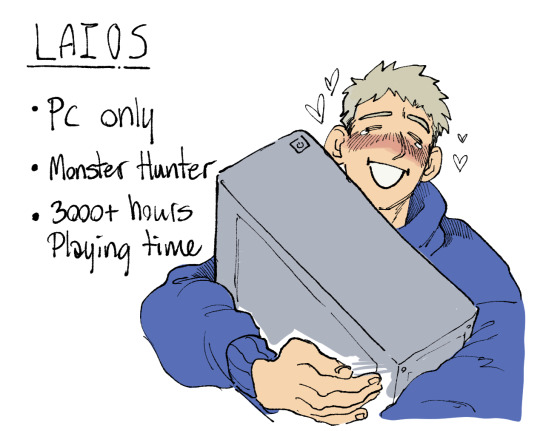
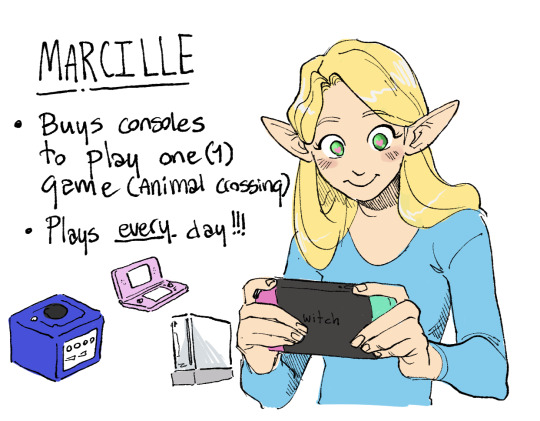
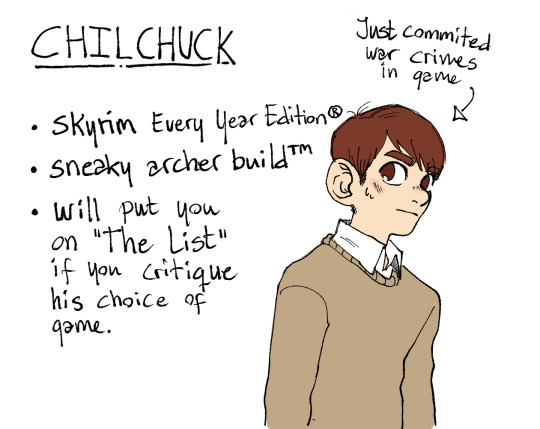
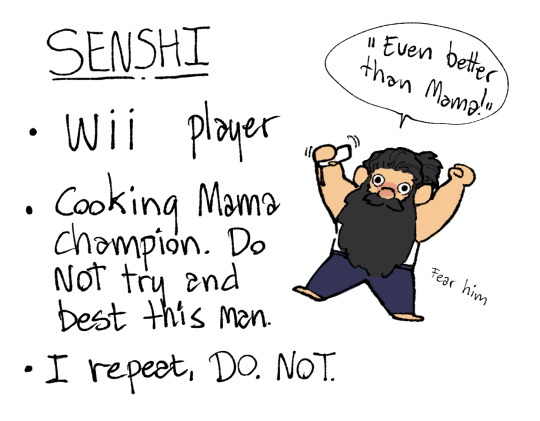
It came to me in my fever dreams
tag yoself, I’m Chilskyrim
73K notes
·
View notes
Text
I’m using AI Dungeon to roleplay Leverage nonsense, and it’s not bad??
like, it is bad, but it’s also very good
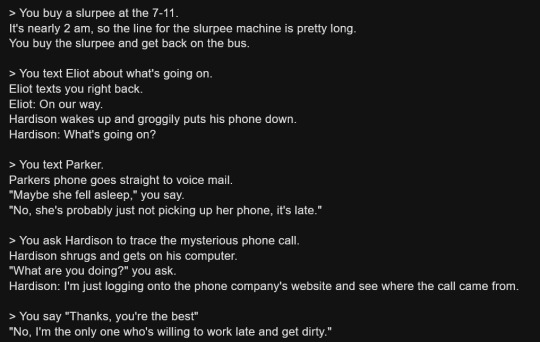
the AI has an opinion about 2am 7-11 slurpee machine lines?
and it thinks texts can go directly to voicemail?
I love it.
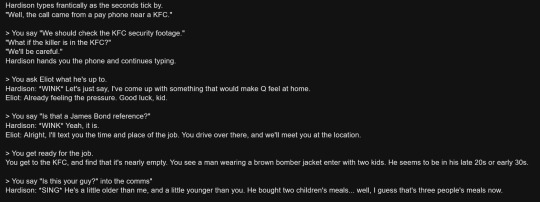
the “*WINK*” kills me

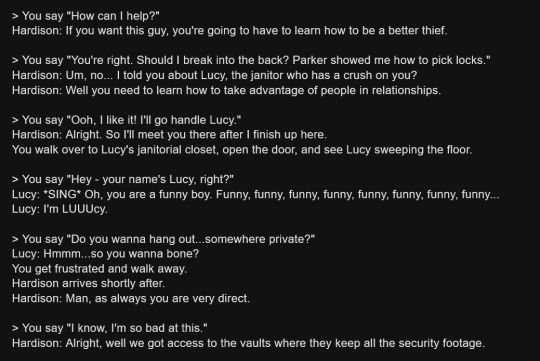
I’m apparently very bad at grifting
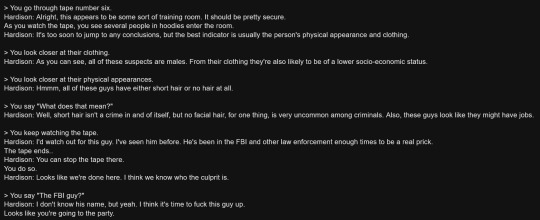
“Well, short hair isn’t a crime in and of itself...”
I can’t
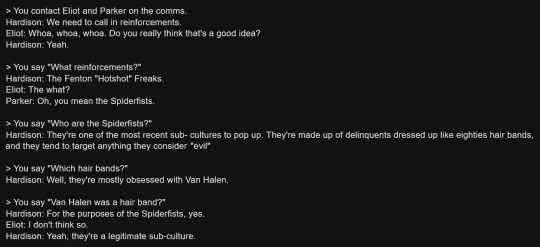
“for the purposes of the Spiderfists, yes”
I’m losing my mind. I love this.
#leverage#personal stuff#in case you don't know how AI dungeon works#I only wrote the bits directly after the > symbol#everything else was generated
4 notes
·
View notes
Link
Arkane Studios' Raphael Colantonio is probably best known among developers today for his work on Dishonored with fellow co-creative director Harvey Smith.
But by the time Dishonored shipped in 2012 Colantonio had already been working at Arkane for over a decade, leading development of games like Arx Fatalis and Dark Messiah of Might & Magic.
These games, made back before the French studio was acquired by Bethesda parent company ZeniMax and expanded with a sister studio in Austin, failed to achieve high-profile commercial success -- to this day, Colantonio is quick to acknowledge Arx was "full of bugs."
What they did achieve, though, was attracting communities of players passionate about the games' mechanics and systems-driven design.
As Colantonio now prepares to ship Arkane's latest project, Prey, Gamasutra sat down with him to briefly chat about the projects he's shaped over the years, and how they've in turn shaped his approach to making games.
So you gave a presentation at the 2006 Montreal Game Summit -- this was ages ago -- and you talked about your experience building a small indie studio in a world of big-budget game companies.
Colantonio: Yeah, with Gamasutra, actually.
So it's been over a decade since then. Arkane is pretty big now, and split across continents. How does it feel?
"We seem disorganized and like we don't know what we're doing, but I think it's part of a process and I really think that it's something that we now embrace and accept."
Feels like a different life. Well, it feels yet so far, and at the same time so recent. It's funny how time works in people's head; in many ways we still feel like this little unknown company that just started a few years ago. Even now, like people say, "So what are you working on?"
"Oh, Dishonored."
"Oh, yeah, I played that game!"
"Yeah, sure." That's how I feel. You're just saying that to be polite, you know?
But yeah, it took a while, but it's great. It shows that with determination and believing in what you do, eventually it works out.
How has the working environment changed? I think fellow devs would be curious to know what it was like, going from one studio to two, each with their own separate projects.
I think it works out for us because it was such a slow incremental process. It took us seventeen years to go from one game - one studio, to two games - two studios.
So it's been a very very meticulous adding one piece at a time. You look at how many people we add a year, it's really not much. So at the end now it's very different even though it felt natural, because Dishonored was made between Lyon and Austin; that was probably the weirdest move for us.
I can't remember exactly how many people we had in Austin and how many we had in Lyon, but it was like two teams -- slightly bigger in Lyon. That was a real weird move and then after that, once we were done just adding people on both ends started to almost feel like you were managing two different studios at that point.
But we're still sharing the same DNA for game design; it's like the cousin that went to a different country and evolved their own way. Because you can still recognize the styles in both games, right? In Dishonored 2 and Prey, even though they're not the same team behind it.
Do you miss having that small studio focus?
Sure, yeah. It's different; when you're ten in the same room and just yell across the room because you need some file or whatever, it's not the same thing as when you have to input it in some software that goes into a list of tasks that maybe one day will be read by someone on the other side of the building.
So I do miss it, but I think we still manage to maintain the same culture and passion because we -- I think we have a very strong culture and we know why we're doing what we do, so we hire people that embrace the same values and they hire people with the same passions. So if you ask anyone at Arcane, most of them know why they're doing what they're doing, even though it's a pretty big team now.
Do you have any specific techniques or processes that you put in place to maintain that sort of culture?
Yeah, I can think of two things -- well three things. One, recruiting is very, very important. We are very, very picky.
I think the second thing is, we have a few values that are important to us. One of them is player choice, for example. So for each game that we do, Dishonored was the same and it's the same now with Prey, we have some little posters that we place everywhere in the office with the name of those values and an example and why it's important to us. Like mantras, almost. Then people wherever they go for a break or lunch or something they see this thing on the wall that would say "multi-solutions" or--
Motivational posters.
Yeah, motivational posters. That's two, and three I would say the leads, who you choose to represent what you want for the team and the game, making sure that they are really in alignment with you and they will perpetrate that culture.
Sure. I know some team leaders who do things like regular team lunches or dinners to help build studio cultures they can rely upon. But that's usually with teams of like ten or twelve people. If you have thirty or forty in your studio...
Yeah, you can't. And funnily enough we've never been so much into those things at Arkane. Like you know there are those big corporate companies that take everybody to Disney World or something. We're just, everybody does what they want to do. Some actually gather together because they want to play some RPG -- you know, Role-Playing --
Tabletop games, yeah.
But this is nothing we enforce. It's strange, we don't do the lunches and all this stuff.
Ahh, everybody's different. Do you yourself ever play tabletop role-playing games?
Not anymore. I used to play Cthulhu, actually, more than Dungeons and Dragons.
You played Call of Cthulhu?
Uh-huh, yeah.
I'm impressed. That's a rough game to play; everybody loses at the end.
Yeah, exactly. Maybe that's why I like it. The tensions between wanting to progress and not wanting to progress because you know that you are a cooler character now, but you're sooner to die.
Playing those games, did that inform your approach to videogame development at all? The way you run teams or the way you design levels or anything like that?
Probably, yeah. Yes, because, in fact, even to this day, if I design a piece of level because I want to highlight a situation that is important to me, I will actually use -- how do you say?
Graph paper.
Yeah, I will still use that with the same kind of iconography that you do on the Dungeon and Dragons.
I think that stuff's fascinating, but before we fall down that rabbit hole I should ask: now that you're wrapping up work on Prey, what have you learned from it that you'll take forward to other projects?
In the specific case of Prey? There's many lessons...on the positive side, I do think that it's really confirmed our approach to multilayered system development where we just develop a system out of context, just with the tools, and we drop it in the simulation and let it live and see what happens. Usually it spawns new ideas.
So you have an AI, for example, that you did not have before and you just give it a few rules and as it's in the game and starts to interact with the rest of the simulation and something weird happens. It pushes objects, for example -- you never thought of that. And because of that it creates some new gameplay, some new opportunities.
So we rely a lot on that and it's actually a really cool way to make games because it falls back to player expectations, I think, in the way that when these things happen, "Oh, you know what? Since this thing happens maybe we should support it and actually do this, this this." As opposed to having some sort of plan from the get-go and then just follow the plan.
So I think that's a technique that...we seem disorganized and like we don't know what we're doing, but I think it's part of a process and I really think that it's something that we now embrace and accept as mythology for us.
Yeah, like the Mimic enemies early on in Prey -- Is that an example of a thing you tested, a creature that can crawl and hide and transform into objects? Where did that even come from?
Initially, it was just we thought it would be cool to have a creature that actually turned into things to hide because we have full ecology for our aliens and how they work and each of them have a role. So the role of the Mimic was to be a scout: it scouts around to gather energy, hides, turns into things. Turning into things came as a later idea. Like, "It hides."
"Okay, how does it hide?"
"Well, you know it goes into corners and it waits for you to show up and jumps you."
Okay, that's a cool idea. Then someone had an idea, I don't remember who. "What if it turned into objects? If it actually picked an object in that room and turned into the object?"
"Oh wow, that's awesome." So we did that. Then that led to another thing because as we were developing this game we also started to think, "How are we going to acquire the powers?"
"Well, what would be really awesome would be if you could steal the powers from the enemies." So we started down that route of, "You can steal this or that." And sometime in a meeting we said, "Hey, hold on. If we can steal the powers, really we should be able to turn into objects as well."
As we said that, half of the room was terrified by the idea because it means, "Oh god, this is going to be -- maybe ridiculous, maybe silly, maybe super-hard to implement," because now you are a small thing in the world and...how are the physics going to handle that? The other half was super-excited about that and people started to laugh about it. So that's what I mean by the game designed itself.
It's like a painting where you know where you're going more or less, but not exactly, and as you're painting and you realize that the blue of the sky over there should actually reflect on that corner over there. And so at the end the painting becomes really defined as you go.
So how do you balance the needs of that creative process with the demands of operating a business?
I think if you look at the leader, you will know what is the culture of the company. In our case it started with game design, game designers, so our very first game [Arx Fatalis] is very game design-oriented. Not very technological. It crashes all the time, is not very production-ready and full of bugs.
I remember thinking it was very neat, though, with stuff like the gesture commands for casting spells.
Right, right. It's neat, but it was not very marketable. It was not ready for the market, and I think as we grew we started to accept other disciplines a little better. So now I think we've reached a balance where we have strong production, strong art, strong tech, while at the same time still maintaining the strong design.
I still think design will always win at the end of the day if there's a conflict between, "Should this game be polished or should it be designed?" I'll still push for the fun thing, rather than the polish. And maybe it's a mistake. It did bite me in the ass a few times, but at some point as you grow you have to...well, now we are also part of Bethesda. So there's a lot of money involved in these games. We cannot just make games in a vacuum and not care about it. So I had to give more and more power to production and et cetera. But unfortunately for everyone I am also the president of the company, so.....
It's tricky. It means that I will always have a personal push for creativity over any of the other disciplines. But I also try to be mindful about it and not run the company against the wall.
I think a lot of devs face the same problem. I should ask also, I notice it's not the same engine as Dishonored 2. You went with CryEngine, right?
Yeah.
Why choose to go with someone else's engine rather than something you build yourself?
Because in fact, when you look back to when we started Dishonored 2, which was a little before we started Prey, actually, we were faced with a few challenges. In the case of Dishonored, our biggest challenge was to make the technology work. Because we knew what game we were going to do, but we did not have an engine for it. Back then the CryTek engine was not ready.
So we said, okay, this is our try is going to be to make our own engine. Because we know what the game is and and we have to make a new team. So that was enough challenge already.
And then you look at Prey, we were not wanting to add some more burden on the Dishonored 2 team because Dishonored 2, we had to to make our own engine there. Now with the same engine if you have to make two games, that would be multiplying the challenges. So [for Prey], the challenge was more like, let's take an engine that we know exists and is solid that we have and tackle a new challenge which is inventing a game.
It's essentially a new type of game, even though it's Prey, it's still a new IP in a way. So it's just risk management, and choosing the right thing. So, you know I was saying your company culture informs how you work, like in my case it's all creative, but at the same time, in this case it was a lot of production calls. We have to be logical.
Yeah, but I do think it's surprising you'd want to avoid having everyone working on the same tech. Whereas I feel an organization like EA, which is obviously much bigger, they're making an effort to bring all of their stuff into one engine.
Yeah, I'm not sure why because it's only a million dollars for those -- It's nothing secret here. The cost of an engine is about a million dollars. Any engine that you can buy and I honestly can't remember how much we payed on the case of CryTek, but it doesn't justify -- It's not a big win to say, "Well, we're going to unify all our games onto one engine." It seems more risky and more of a constraint for teams.
In fact, the entire Bethesda organization, everytime we try starting a game, they never care. They always ask us, "What engine do you want to use?" It doesn't matter if we want to use our engine, some new engine. It's a cost. If you make your own engine it's going to cost you something. If you buy one it's going to cost you something. There is a cost -- I can understand why some people want to unify everything because this way they can have their teams that know how to use their tools. Once you know the production pipeline of an engine you can reuse that for every time. So there is some sort of a save.
But at the end of the day there are so many constraints as well to use -- I know a publisher that now went under who were obsessed with using the unified engine across all their teams all their studios all over the world. It drove them to their death, because it's more constraint on the developers than there is any benefit.
I honestly think it's an ideology and it's a political idea that sounds beautiful. "Well, we'll put our efforts combined into one thing. Then we can share technology between studios." It sounds beautiful, but it never works.
So let's talk about beauty, for a sec. What is one thing you hope fellow game developers see in this game? Is there a certain level, or a mechanic, or a little production trick you did somewhere?
Well, your question has multiple facets to it. One could be, "What is it that they will praise us for?" The other one would be, "What there is that hopefully will inspire them?" So the inspiring thing -- As a player, I want to play more games that are real-life simulations and let me play the way I want and give me an experience that I feel I own, as opposed to something very directed. There are some games that do that, but there's also a lot of games that go somewhere else.
So I want to see more and more games that allow me -- Because that's the difference between a movie and a game, I think. So the more games that are simulations, the more fun it is to me. So I hope some future generations are going to go deeper in that genre.
As far as the thing I hope people recognize, I think it's the complexity of making a new world. Everything is designed in this world. The chairs, the tables, everything is designed -- The fashion. So I'm sure the artists and storytellers will have a chance to appreciate the amount of work that was put into the researching the background of the world and how it works.
Yeah, you had the idea for this long before you decided to use the Prey name, right? Do you remember any of the names you were originally going to use?
There were many and I think one of them was after the name of the alien race themselves, which is the "Typhon." So then we started to think, "Hold on, people aren't going to know if it's with an i, a y, is it ph, is it f?" So at the end of the day Prey was actually a pretty solid name.
Yeah, it's easy to spell, short. So if you had to give one piece of advice to fellow game developers, given your time in the industry, what would you say now?
You know, I think we're at a fascinating phase because there's way many more propositions than there ever was before. Now you can play mobile, different types of formats of games, like the indie games for $20 or the AAA for more. I think it's a great time to succeed. Better than when there was only one channel.
Now, there's more noise as well so it's hard to get through this noise. And also the other thing that I notice is that people give less importance to how amazing is your graphics. That I think is a great, great opportunity for developers to focus on their message, whether it's artistic message or gameplay message, rather than the form so much. Because we've been so blinded by trying to get the latest technology, the latest shader, the latest detail that costs a fortune. It's a big distraction from what really matters in the game. So I hope people focus on the art intentions and the gameplay intentions more than the technology, and how amazing the graphics are.
0 notes